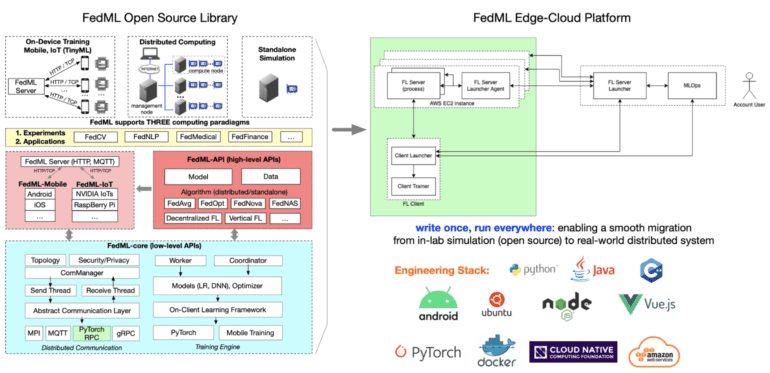TL;DR:
- FedML, a startup co-founded by Salman Avestimehr, secured $11.5 million in seed funding at a $56.5 million valuation.
- The company offers a collaborative AI platform that enables companies to train, deploy, monitor, and improve AI models on the cloud or edge.
- FedML aims to overcome the challenges faced by businesses in deploying AI by providing cost-effective solutions and addressing data sensitivity concerns.
- The platform supports custom AI models and models from the open-source community, allowing users to create collaborative groups and sync AI applications across devices.
- FedML recently introduced FedLLM, a training pipeline for building domain-specific large language models (LLMs) while ensuring security and privacy.
- The company plans to build a community of CPU and GPU resources to host and serve models, combining decentralized compute with MLOps capabilities.
Main AI News:
The surge of interest in artificial intelligence (AI) within the corporate realm continues to escalate, as evidenced by a recent survey revealing that nearly two-thirds of companies intend to maintain or increase their investments in AI and machine learning throughout this year. However, these companies frequently encounter obstacles when it comes to deploying various AI applications in production.
A survey conducted by Rexer Analytics in 2020 found that only 11% of AI models are consistently deployed, while a Gartner analyst estimated that roughly 85% of big data projects fail to reach fruition.
Motivated to address these challenges, Salman Avestimehr, the founding director of the USC-Amazon Center on Trustworthy Machine Learning, co-founded a startup aimed at enabling companies to train, deploy, monitor, and enhance AI models on the cloud or edge. This startup, known as FedML, recently secured $11.5 million in seed funding, valuing the company at $56.5 million. The funding round was led by Camford Capital and featured participation from Road Capital and Finality Capital.
According to Avestimehr, many businesses are keen on training or refining custom AI models using company-specific or industry data in order to address a wide range of business needs. However, the exorbitant costs associated with building and maintaining these custom AI models due to high expenses related to data, cloud infrastructure, and engineering act as major deterrents. Additionally, the proprietary data used to train these custom AI models is often sensitive, regulated, or isolated.
FedML claims to overcome these barriers by offering a collaborative AI platform that facilitates the collaboration between companies and developers on AI tasks, allowing them to share data, models, and compute resources. The platform can support an unlimited number of custom AI models or models sourced from the open-source community. Customers can create collaborative groups and automatically synchronize AI applications across various devices, such as PCs. Collaborators can add devices, including servers and mobile devices, for AI model training and monitor the training progress in real time.
Recently, FedML introduced FedLLM, a training pipeline designed for constructing domain-specific large language models (LLMs) like OpenAI’s GPT-4 using proprietary data. FedLLM is compatible with popular LLM libraries such as Hugging Face’s and Microsoft’s DeepSpeed. The pipeline aims to enhance the speed of custom AI development while upholding security and privacy.
In essence, FedML shares similarities with other MLOps (machine learning operations) platforms available, where MLOps refers to a suite of tools that streamline the process of deploying, maintaining, and monitoring AI models in production. Some notable MLOps platforms include Galileo, Arize, Seldon, Qwak, and Comet, alongside established players like AWS, Microsoft, and Google Cloud, which offer their own MLOps tools (e.g., SageMaker and Azure Machine Learning).
Nevertheless, FedML harbors aspirations beyond merely developing AI and machine learning model tools. Avestimehr envisions building a community of CPU and GPU resources to host and serve models once they are ready for deployment. Although the specifics are yet to be finalized, FedML plans to incentivize users to contribute their compute resources to the platform, potentially through tokens or other forms of compensation.
The notion of distributed and decentralized compute for AI model serving is not entirely novel, with ventures such as Gensys, Run.AI, and Petals already exploring this realm. Nonetheless, Avestimehr believes that FedML can achieve greater reach and success by combining this compute paradigm with an MLOps suite.
Avestimehr emphasized that FedML empowers developers and enterprises to build large-scale, proprietary, and private LLMs at reduced costs. What sets FedML apart is its ability to train, deploy, monitor, and improve machine learning models anywhere while fostering collaboration through shared data, models, and compute resources. This significantly lowers costs and expedites time to market.
Supporting his claims, FedML, with its workforce of 17 individuals, boasts approximately 10 paying customers, including a prominent automotive supplier. The company has accumulated a total of $13.5 million in funds, including the recent funding round. Avestimehr asserts that the platform is being utilized by over 3,000 users globally, undertaking more than 8,500 training jobs across a staggering 10,000 devices.
“For data and technical decision-makers, FedML transforms the dream of affordable custom AI and large language models into a reality,” confidently stated Avestimehr. “Thanks to its foundation in federated learning technology, coupled with its MLOps platform and collaborative AI tools that facilitate developers in training, serving, and monitoring custom models, building custom alternatives has become an accessible best practice.”
Conclusion:
The funding raised by FedML and its innovative approach to combining MLOps tools with a decentralized AI compute network demonstrate the growing interest in AI within the enterprise market. By addressing the challenges faced by companies in deploying AI models, such as high costs and data sensitivity concerns, FedML offers a collaborative platform that enables cost-effective AI development and deployment. This development signifies the increasing need for accessible and efficient AI solutions in the market, with FedML poised to make a significant impact in the industry.

